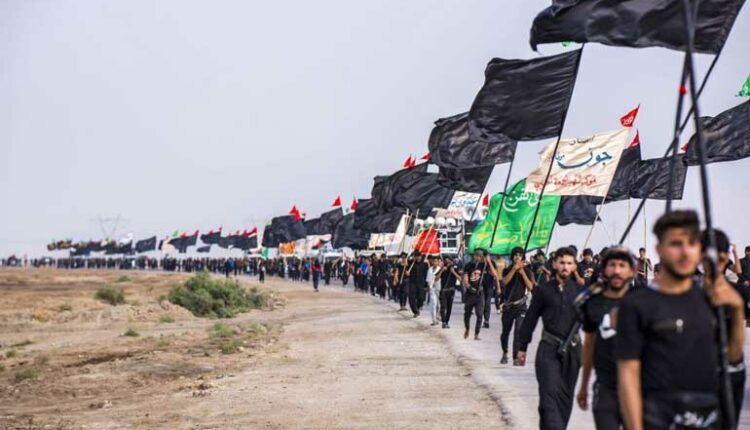In the Islamic societies, the religious rituals and ceremonies form part of the culture and it is holding these ceremonies that helps their expansion and further public acceptance among other societies. To put it differently, the religious and Islamic rituals, with correct and principal arrangement, expand their spheres of influence to non-Muslim communities. This cultural influence is apparant in the expansion of Imam Hussein mourning ceremonies from the Islamic nations to Western and European countries in the past years. Imam Hussein, the grandson of Prophet Muhammad, symbolizes the struggle for real freedom and human values and principles. He was martyred in 680 at the battle of Karbala.
Additionally, among the Islamic rituals, there is the Arabeen that occurs forty days after the day of Ashura. The Arbaeen marches in recent decades have captivated attention of many. The Arbaeen ceremony, especially over the past two decades that has been freely marked, snowballed year by year. Now millions of people from various societies and nationalities, and even faiths, mark the day of Arbaeen, signaling that the ceremony is no longer limited to Iraqi boundaries; rather, it has believers in the most distant parts of Canada and the Latin America who travel to Iraq in September to the Iraqi holy cities.
Arbaeen trek: from the palm trees to highway
The Arbaeen marches have been held freely since two decades ago, after decades of ban under Saddam Hussein rule. In the late 1960s, the ruling Baathist Party of Iraq banned them and even sometimes dealt violently with the marchers. Ayatollah Sayed Mohammad al-Sadr, a top Shiite cleric, even once declared the marches to the holy city of Karbala are obligatory. In Arbaeen of 1977, the Baathist government banned religious ceremonies and marches and setting up 'mawkebs', roadside service stations for marchers. But people defied the ban and moved to Karbala in the same year. The move drew a reaction from the Baathists who killed some marchers and imprisoned others. Sayed Mohammad Baqer al-Hakim was handed life sentence and other clerics like Sayed Muqtada al-Askari and Sayed Mohammed Hussein Fadhlulah, who fled the country, were sentenced to death in absentia.
Some Iraqis recall memories of their dangerous marches during Saddam's time to hold the Arbaeen procession secretly and passing through palm trees and gardens. At that time, Iraqi Shiites had to pass through palm trees and gardens to cross the march route in order not to be seen by the government agents. Saddam was very worried that the Arbaeen processions would become an opportunity for the Iraqi people, particularly the Shiites, to flex their muscles to his dictatorship and, therefore, he was watchful not to allow the ceremony.
After the fall of Saddam, the Iraqis have held the Arbaeen marches freely on the highway linking Najaf to Karbala, and there were no more news of the previous restrictions. Since 2003, this march has been held bigger and more magnificent every year. This march, which is held in the days leading to the Arbaeen, is held from different parts of Iraq towards Karbala with the aim of Arbaeen pilgrimage. Most of the pilgrims go to Karbala from Najaf, and along the procession routes, there are mawkebs serving them. This event is considered the world's biggest annual religious congregation. The number of the pilgrims varies between 12 to 20 million every year, official figures suggest.
Values of Arbaeen procession
Undoubtedly, in addition to its spiritual and religious values, the Arabeen has countless moral values, and it is these moral values that, in addition to its spiritual and religious aspects, attract millions of people every year. Official figures of the Iraqi ministry of interior indicate that at least 1.3 million foreign pilgrims visited Iraq and participated in the Arbaeen procession in 2013. According to Iraqi government's figures published in 2018, this number reached more than 1.8 million, and it is expected that this year, the number of foreign pilgrims participating in the Arbaeen procession exceeds several millions.
Al-Ahd news website of Iraq in October 2019 reported that about 21 million people participated in that year's procession from 4 to 19 October. 17 million were Iraqi citizens from inside the country and outside it who accounted for 40 percent of Iraq's people or about 75 percent of the country's Shiites, recording the human history's largest congregation.
Another value of the Arbaeen marches is congregation of people from over 20 countries: 3 million from Iran, half a million from Pakistan, and half a million from other countries, mainly India, Azerbaijan, Turkey, Afghanistan, Lebanon, Kuwait, Bahrain, and Saudi Arabia hold the largest foreign pilgrims' gathering in a few days.
The type of interactions and social relations forming in the Arbaeen procession shows the greatest feelings and emotions of humans to their fellows. Establishing thousands of mawkebs providing hundreds of services with voluntary work prove that regardless of nationality, language, and nationality, humans can serve one another.
The important point about the Arbaeen is its being fully
popular and voluntary. Actually, it has well shown the humanitarian
aspects of a non-state and non-political event on a global scale, and it
is these values that make Arbaeen procession transcending Iraqi borders
and attracting people from around the world.
/129

